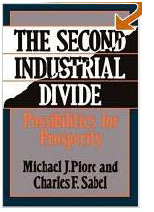After Fordism: Piore and Sabel on Flexible Specialisation
Michael J. Piore and Charles F. Sabel were two professors at MIT who warned in the 1980s that the Fordist model of work was about to come to an end, and perhaps should be brought to an end. Piore and Sable explain the rise of post-Fordism.

Many signs suggest that the Fordist model of organization is being challenged by new forms of the division of labor. International competition and … domestic conflicts … are driving many large firms out of mass markets for standardized goods. To survive this challenge manufacturers have no choice but to produce more-specialized, higher-quality products … Where Fordism calls for the separation of conception from execution, the substitution of unskilled for skilled labor and special-purpose for universal machines … specialization often demands the reverse: collaboration between skilled designers and skilled producers to make a variety of goods with general-purpose machines.
What different forms this collaboration can take … provokes broader debate about our fundamental ideas of hierarchy … By modifying currently existing technologies, shop-floor organization, and managerial hierarchies, existing Fordist firms may be able to meet the changing demand … [It] is … conceivable that the changes underway could lead to … new types of workers whose activities and self-conceptions cut across [older] boundaries.
The … company-level response we will call flexible specialization … [This] is a strategy of permanent innovation: accommodation to ceaseless change, rather than an effort to control it. This strategy is based on flexible—multi-use—equipment; skilled workers; and the creation, through politics, of an industrial community that restricts the forms of competition to those favoring innovation. For these reasons, the spread of flexible specialization amounts to a revival of craft forms of production that were emarginated at the [origins of mass production].
Sabel, Charles F. 1982. Work and Politics: The Division of Labour and Industry. Cambridge: Cambridge University Press. pp. 194–195.|| Amazon || WorldCat
Piore, Michael J. and Charles F. Sabel. 1984. The Second Industrial Divide: Possibilities for Prosperity. New York: Basic Books. p. 17. || Amazon || WorldCat
